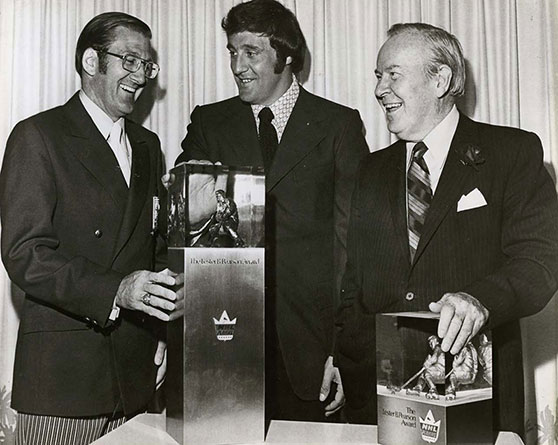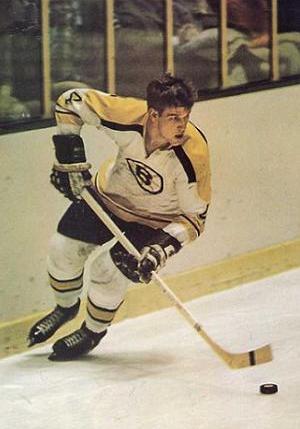“If you asked him a question he’d say, ‘Why the [expletive] are you asking me a [expletive] question. I’m breaking my [expletive] back for you. You’re lucky you’re getting [expletive] paid $50 bucks a game. So sit the [expletive] down and shut the [expletive] up.’ That’s the type of guy Alan Eagleson was.” – Mark Howe

Some hockey pundits believe Gary Bettman is the worst person to grace the game of hockey. Others feel Sean Avery should be at the forefront. Neither of these icons can hold a candle to Robert Alan Eagleson, Q.C., O.C.. If there was ever a tyrant, he was it.
He was (at one point) one of the most powerful and highly respected men in Canada and the virtual Czar of hockey in North America who was eventually exposed as a duplicitous, destructive, and vampiric destroyer of both hockey’s honor and the careers of many of its players both great and small.
Alan Eagleson’s Entrance Into The NHL
‘The Eagle’ started his career in law. Graduating from the University of Toronto, Eagleson began befriending people and players with ties to the NHL. It was in 1967 that he decided to put together the NHLPA after the first one failed in 1959. With the help of Bob Pulford, a former NHL player, Eagleson became the first executive director of the NHLPA.
Eagleson promised (among other things) pension plans and insurance payments to injured players. As you will later find out, the man said one thing and did the opposite, so long as it was in his favor. He was a conniving businessman with little-to-no regard for the players he represented.
International Tournaments
With all the bad that Eagleson brought with him, he didn’t leave the game of hockey without some good.
In 1972, he spearheaded what would become the greatest international tournament ever created. The Summit Series was the most prolific gathering of NHL and International talent assembled on one sheet of ice.
The Soviet National Hockey Team was something of an enigma. Nobody knew of their strenuous workout regiments, their time spent in military barracks, their rigorous practices 11 months out of the year.
The Canadians thought they’d wipe the Soviets clean in an 8-game series. That was until players like Kharlamov, Mikhailov, Yakushev, and Tretiak stepped onto the ice. The Soviets took the Canadian National Team by surprise and slaughtered them 7-3. Canada had a record of 1-3-1 and needed to win the final three games to win the Summit Series. They did so in dramatic fashion.
There are three things Canadians will remember:
- When Kennedy was shot.
- When the first man landed on the moon.
- When Paul Henderson scored the game-winning-goal in the last game of the Summit Series.
And what was Alan Eagleson’s place in all of this? The Globe and Mail had this little blurb:
“Mr. Eagleson’s role on that team – the first ever to be called Team Canada – was so expansive that his title simply became Uncle Al. He was manager and motivator, travel agent and godfather, firebrand and peacemaker.
The ’72 series made him a household name.”
Besides the creation of the Summit Series, Eagleson had his 15 seconds of fame during the final game – much to the chagrin of the Soviet military officials.
Atrocious calls were keeping the Canadians in the penalty box and the Soviets on the scoresheet. Alan Eagleson began to raise hell and was being restrained by Soviet officials until the Canadian players stepped in and pulled him away. He was escorted to the Canadian bench where he stayed for the remainder of the game.
Following the highly popular Summit Series, Eagleson and his staff decided to make another international event entitled the Canada Cup – which Canada won four out of the five times it was held. The biggest game came in the 1987 Canada Cup.
With the game tied 5-5, head coach Mike Keenan sent out Mario Lemieux, Wayne Gretzky, and Dale Hawerchuk with minutes to spare. As the time was ticking down, Lemieux was fed a pass streaking into the zone by Gretzky and netted the series-clinching goal with 1:26 to play.
Eagleson/Orr Saga
Alan Eagleson changed the game of hockey in more ways than one. His most impactful move was becoming the first ever NHL agent. Eagleson didn’t dilly dally with scrubs. He went for the big guns. His first client: Bobby Orr.

Orr signed the first million dollar contract of any NHL player in the history of the game. Revered across North America, Orr spent most of his career with Boston. But in his last season with the club, a vicious contract dispute ensued between Eagleson and the Bruins. While Eagleson was telling the media what the Bruins were offering ($295 thousand dollars + 18.5% share of the Boston Bruins), he was telling Orr something completely different.
According to Jake Newman, Eagleson told Bobby Orr that ‘Boston doesn’t want you’. So Bobby Orr went ahead and signed a contract with the Chicago Blackhawks, playing in 26 total games over the next three years. He tried to make a comeback in the 1978-79 season, but only played in six games for the club before retiring for good.
The contract fiasco between Boston and Eagleson would debilitate Orr financially over the next few years. By 1980, he was essentially bankrupt. Eagleson was the first person to chastise him for spending more than he earned and living life ignoring his financial advice. The 18.5% stock in Boston would’ve served him just fine in the late 70s and more so today.
Needless to say, Orr is still not a fan of Eagleson. But Alan didn’t stop there.
Russ Conway was an editor for The Eagle-Tribune in Massachusetts and began writing in-depth articles about the inner workings of Alan Eagleson which in 1995 he compiled into a book called “Game Misconduct: Alan Eagleson and the Corruption of Hockey”. These pieces led to an investigation in the United States and Canada.
From the five Canada Cup tournaments Eagleson ran, for instance, expenses consumed 70% of the receipts and the players received just eleven cents on the Dollar. In comparison, a 1997 audit of the 1996 World Cup of Hockey showed it made a profit of $14.7-Million on receipts of $26-million which exceeded the net profits of all five Canada Cup run by Eagleson in which expenses consumed 70% of every Dollar. In the 1996 World Cup, the players’ cut exceeded 40% of the total revenues.
“Those are big differences,” then NHL senior VP Brian Burke told Conway later “”It makes you wonder what was going on with Eagleson’s management back then.”
Ed Kea Fights For His Life AND Insurance Payments
I spoke with NHL historian Bruce Cooper about a famous instance involving Eagleson and Ed Kea, a minor league player who struggled to receive insurance payments. He parlayed to me:
“One notorious case was that of Ed Kea who suffered a career ending injury. He had suffered a traumatic brain injury that required major brain surgery leaving him physically and mentally disabled.
Russ Conway wrote that Eagleson “didn’t even have the common decency to go visit the family. He wouldn’t aid them in the insurance process. He was gone. Crush up the cigarette pack, throw it out. Next!”
Kea’s family of four kids struggled for several years because he was unable to hold a job and Eagleson did nothing to help.
Kea was playing in the minors at the time (Salt Lake Golden Eagles) although under contract to St. Louis and was going to be recalled after the game. But since he was not playing in an NHL game the NHL catastrophic injury benefits did not apply.
That insurance for players under NHL contracts playing in the minors was the reponsibility of the NHLPA and apparently Eagleson had not paid the premiums, so it had lapsed for NHLPA members playing in the minors. Eagleson never told Kea that he was not insured. Kea was supposed to get $100,000 for the disability. He eventually got $20,000 three years later.”
Alan Eagleson’s Fall From Grace
Following Conway’s years of reporting, Eagleson was finally charged in 1994 by the FBI with 34 counts of fraud, racketeering, and embezzlement. Three years later, Canada followed suit by charging him with fraud. In all, Eagleson pleaded guilty to six counts putting him in jail for 18 months.
Having defrauded many players of the course of his tenure as executive director of the NHLPA, Eagleson was not allowed to practice law any long and his Order Of Canada – the 2nd highest honor bestowed on any Canadian citizen – was stripped from him.
To put the cherry on top, Hall of Famer Brad Park (along with 18 other HOFers) released a statement saying they would resign from the Hall of Fame if Alan Eagleson remained in it. Knowing he would eventually get kicked out of the Hall of Fame, Eagleson resigned himself, further tarnishing his image.
Alan Eagleson was the worst person hockey history has ever seen. Held in such high regard in the early parts of his career, Eagleson was looked at as a savior to the players, the NHL, and international hockey only to turn his back on them and use their money for his own personal gain.
In the end, the “Eagle” didn’t land.
Instead, he crashed and burned taking with him many innocent victims.
Great read Shawn. Just finished Orr’s book. He doesn’t hold the eagle in high regard
Another excellent piece, Shawn. Eagleson did terrible damage to the game and destroyed the finances of a whole generation of pro hockey players out of pure personal avarice. In many ways the NHLPA has still not recovered from how he corrupted it,